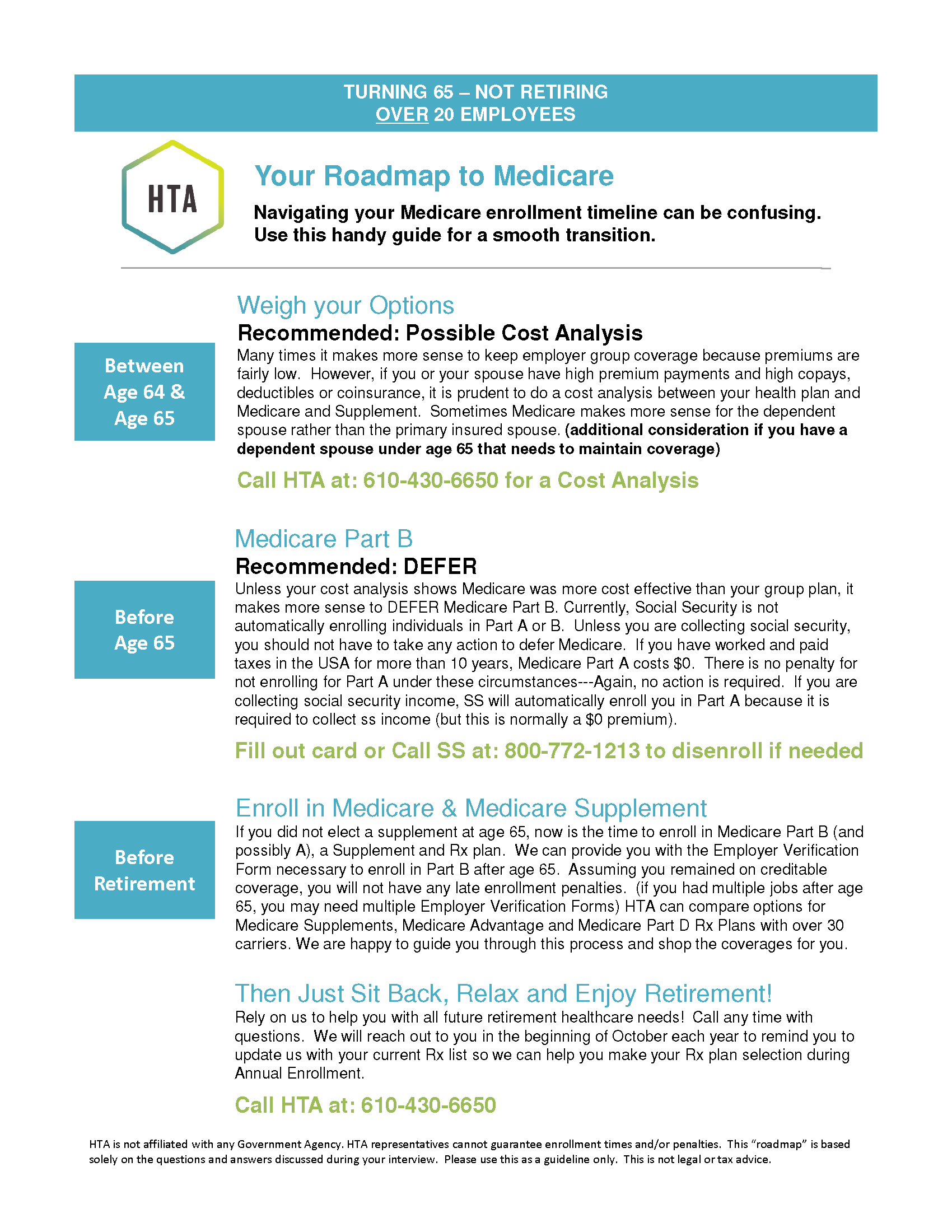Roadmap to Medicare
Over 20 Employees
Your Roadmap is based on…
- Your Primary Insured intends to remain ACTIVELY WORKING (at the employer providing your benefits)
- You ARE covered under the Group Health Insurance Plan
- The employer providing health insurance has MORE THAN 20 employees
Recommendation Summary
Since you have creditable coverage (group coverage based on current active employment), you are NOT required to enroll in Medicare at this time. However, if you do not have a Health Savings Account, we recommend that you enroll in Medicare Part A and defer your Part B.
If you do not enroll in Medicare A and/or B at this time, you will not accrue a penalty. You will have a Special Enrollment Period (SEP) when your group coverage and/or your employment end to enroll in Medicare. You will need to show proof of creditable coverage when you go to enroll later (it is not necessary at the time you defer).
Will I receive a penalty if I don’t enroll now?
No. You will not receive a late enrollment penalty, provided you remain covered under the group creditable coverage and your primary insured remains actively at work at the employer that provides your benefits.
Do I need Medicare to have full coverage?
No. Your group coverage should remain primary insurance as long as the employment that it is based on continues.
What is my deadline to enroll?
You can enroll anytime after age 65 up to 8 months after your group coverage or the employment that it is based on ends.
Secondary Insurance Options
Since your current plan will remain primary to Medicare as long as you remain enrolled in it, Medicare A and B is not required to have full coverage at this time. You will have the option to keep your Group Health Plan or switch to Medicare and elect a Medicare Supplement Insurance Plan or Medicare Advantage Plan and Medicare Prescription Drug Plan.
Underwriting Considerations
Once you enroll in Medicare Part B, you will have an Open Enrollment Period/Special Election Period to choose your secondary coverage without having to medically qualify.
Additional Considerations
Spouse Under Age 65- If your spouse relies on your group health plan for benefits, please be mindful that if you come off your group plan, your spouse will have to go on COBRA, seek benefits through their respective employer, or purchase individual health insurance until they become Medicare eligible.
Effective Date Considerations- Reminder, when you apply for Medicare at age 65, you cannot choose a specific effective date for the benefits (and premiums) to start. The only way to influence the effective date is by which month you enroll online. Please contact us ASAP if you are trying to achieve a specific start date that is something other than the first of the month of your 65th birthday (possibly to coordinate with your group plan ending).
Important HSA Considerations– You cannot continue to contribute to your Health Savings Account (HSA) once you enroll in Medicare Part A. If you are enrolling in Medicare after age 65, your Part A effective date may be back dated up to 6 months. Please contact us to discuss the HSA maximum contribution rate for you circumstances. Click Here for Details and Rules.
- This does not apply to Flexible Spending Accounts (FSA) or Health Reimbursement Accounts (HRA). Medicare does not have any restrictions on these types of accounts.

